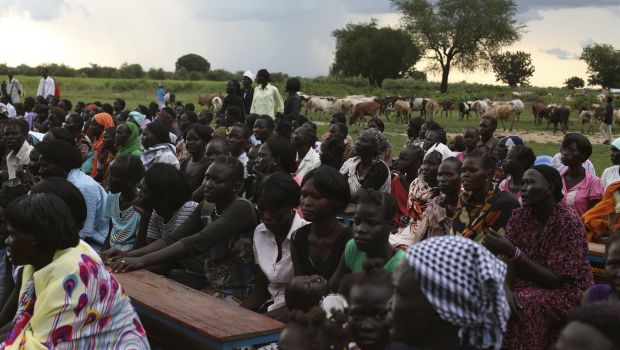
File photo—Villagers from the Ngok Dinka community congregate in prayers for a peaceful referendum in the Abyei region on September 14, 2013. (REUTERS/Andreea Campeanu)
A congress was held for Dinka’s nine communities to draw up the referendum’s schedule. The final results of the referendum are expected be announced on October 31, 2013.
The meeting, began on Friday in Abyei, was attended by political and popular leaders, as well as the president and members of the Abyei supervisory committee, all exclusively from South Sudan. The congress was also attended by leaders of the ruling People’s Liberation Movement party, most prominently, former Prime Minister and member of the Supreme Political Committee of the Referendum, Deng Alor. However, leaders of the Sudanese People’s Liberation Army (SPLA) were not present.
A member of the media subcommittee of the Abyei Referendum, Shoul Kat Shoul, said that the congress unanimously approved the laws and regulations governing the referendum. Registration of eligible voters is scheduled for October 20-23, 2013.
According to the regulations, a list of eligible voters will be announced on October 24. Voting will begin on October 27 and conclude on October 29, and the results are expected to be announced on October 31.
Shoul indicated that during the meeting it was decided that a referendum commission shall be formed, with a judge as chairman. A team from the African Union (AU) is expected to arrive in the region to closely examine the situation on the ground.
As well as the dispute between Sudan and its southern neighbor, Abyei is currently experiencing unrest and clashes between the Dinka and Misseriya peoples, who have accused each other of deploying armed militias. Peacekeepers from the Ethiopian military have been stationed there since 2011.
Maged Kour, a former minister in Abyei, accused a number of leaders from South Sudan’s ruling People’s Liberation Movement party of attempting to push the region to the verge of civil war. In a statement to Sudan’s official news agency, Kour said that a number of leaders are persisting in their demands that a referendum on the future of the territory be held, in an overt challenge to the AU’s recent decision to postpone it.
A territory-wide referendum was originally scheduled for October 2013.
Kour accused Deng Alor, a leading figure in the Sudanese People’s Liberation Army and former minister in the government of South Sudan, of mobilizing the Dinka people in a number of regions and stoking their anger at the Sudanese government.
Kour went on to call for a crackdown on groups of young activists, calling themselves “Youths for the Referendum,” who he accused of being backed by Deng Alor and his aides in the Anit area of southern Abyei.
Kour also said the referendum will have a negative impact on the region’s security and stability. He called upon UN troops in the region to take measures to stop the movements by Alor’s adherents, particularly as the AU had settled this issue, and demanded that Khartoum take the necessary security precautions should any problems occur.
Sudan’s President Omar Al-Bashir is expected to begin a visit to South Sudan on Tuesday, in response to an invitation from South Sudan’s president Salva Kiir, to hold talks to discuss a number of pending issues between the two countries.
The most prominent issue on the agenda is the status of Abyei and the referendum. According to a proposal outlined by the AU in September 2012, the referendum must be conducted by October 2013, but Khartoum refused the proposal, which was approved by Juba. The African Peace and Security Council have refused to conduct a referendum that only has the backing of one side.
South Sudan’s Minister of Information Micheal Makuei Lueth told Asharq Al-Awsat that the referendum cannot be held this month for practical reasons.
Lueth added “we in South Sudan are persisting on holding the referendum in the Abyei district, yet an agreement to this effect must be reached with Sudan, the AU and the Security Council.”
Meanwhile, US envoy to Sudan Donald Booth is due to visit Khartoum mid-November to conduct talks with Sudanese officials on a number of issues of mutual concern, as well as the US role in Sudan in the future.
In statements to the press, the US charge d’affaires in Khartoum, Josef Stafford, said that his country is greatly concerned about the issues of Abyei, Darfur, the Blue Nile and South Kordofan.
